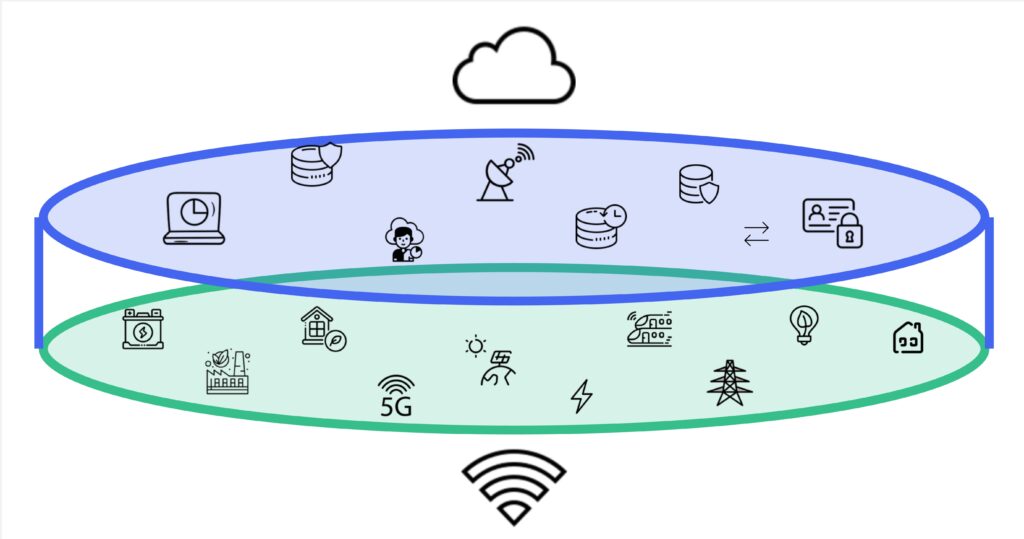Understanding DePIN: The Backbone of Decentralized Networks, represents a transformative shift in how data is stored, managed, and protected in the digital age. It is a decentralized protocol that emphasizes data privacy, security, and user autonomy. Unlike traditional centralized systems where data is stored in a single location, DePIN utilizes a distributed network of nodes to ensure data is securely encrypted and replicated across multiple locations.
Importance of DePIN in Decentralized Networks
The significance of DePIN in decentralized networks cannot be overstated. It provides the foundational infrastructure for a wide range of applications that require robust privacy and security measures. By leveraging blockchain technology and advanced cryptographic techniques, DePIN eliminates single points of failure and enhances data integrity. This is crucial for maintaining trust in decentralized ecosystems, where the risk of data breaches and unauthorized access is significantly reduced.
Brief Overview of the Blog
In this blog, we will delve into the evolution of data privacy, explore the inner workings of DePIN, highlight its key features, discuss its benefits, and examine its real-world use cases. Additionally, we will address the challenges faced by DePIN and its future developments, concluding with the importance of understanding DePIN for the future of decentralized networks.
Evolution of Data Privacy
Historical Perspective on Data Privacy Issues
Data privacy has always been a critical concern, even before the advent of the digital era. In the past, data was often kept in physical forms, such as paper records, which were susceptible to theft, loss, and unauthorized access. With the digital revolution, data began to be stored electronically, introducing new challenges related to data breaches, hacking, and cyber threats.
Challenges Faced in Traditional Centralized Networks
Centralized networks have long been the standard for data management. However, they come with significant drawbacks. These include vulnerabilities to cyber attacks, data breaches, and the potential for misuse of data by centralized authorities. Centralized systems also suffer from scalability issues and single points of failure, making them less reliable for large-scale, sensitive data management.
Introduction of Decentralized Solutions like DePIN
The introduction of decentralized solutions like DePIN marks a significant leap forward in addressing these challenges. By distributing data across a network of nodes, DePIN ensures that no single entity has complete control over the data. This decentralization enhances security, privacy, and data integrity, providing a more resilient and trustworthy system.
How DePIN Works
Explanation of the DePIN Protocol
DePIN operates on a decentralized protocol that leverages blockchain technology to manage and store data. The protocol involves multiple nodes that participate in data validation, encryption, and replication processes. Each node maintains a copy of the data, ensuring redundancy and availability even if some nodes fail.
Role of Cryptography in Ensuring Data Privacy
Cryptography is at the heart of DePIN security measures. Data is encrypted before being stored on the network, making it inaccessible to unauthorized users. Only users with the correct decryption keys can access the data. This cryptographic approach ensures that data remains confidential and secure.
Decentralized Storage and Authentication Mechanisms
DePIN utilizes decentralized storage mechanisms where data is split into fragments and distributed across multiple nodes. This ensures that no single node holds the entire dataset, enhancing security and reducing the risk of data breaches. Additionally, DePIN employs decentralized authentication mechanisms, where users verify their identities through cryptographic proofs rather than relying on centralized authorities.
Key Features of DePIN
Data Encryption and Decryption
DePIN employs advanced encryption techniques to protect data at rest and in transit. Data is encrypted using robust algorithms, ensuring that it remains secure and confidential. Decryption is only possible with the correct keys, which are securely managed and distributed.
Distributed Storage and Replication
One of the core features of DePIN is its distributed storage architecture. Data is fragmented and stored across multiple nodes, ensuring redundancy and availability. This distributed approach not only enhances security but also improves data accessibility and reliability.
Access Control and Permission Management
DePIN offers sophisticated access control and permission management features. Users can define who can access their data and under what conditions. Permissions are managed through cryptographic keys, ensuring that only authorized users can access sensitive information.
Secure your future with SRP Coin – invest in the revolutionary power of decentralized storage today!”
Benefits of DePIN
Enhanced Data Security and Privacy
DePIN significantly enhances data security and privacy by leveraging decentralized storage and advanced cryptographic techniques. Data is fragmented, encrypted, and distributed across multiple nodes, making it highly resistant to breaches and unauthorized access.
Elimination of Single Points of Failure
By distributing data across a network of nodes, DePIN eliminates single points of failure. This enhances the resilience and reliability of the system, ensuring that data remains accessible even if some nodes fail.
Increased Transparency and Trustworthiness
DePIN enhances transparency and trustworthiness in data management. Every transaction and data modification is recorded on the blockchain, providing an immutable and transparent audit trail. This ensures that users can trust the integrity and authenticity of the data.
Use Cases of DePIN
Secure Messaging and Communication Platforms
DePIN can be utilized to build secure messaging and communication platforms. By leveraging its encryption and decentralized storage capabilities, these platforms can ensure that messages remain private and secure from eavesdropping and unauthorized access.
Decentralized Social Networks
DePIN provides the infrastructure for decentralized social networks where user data is securely stored and managed. Users have full control over their data, and the risk of data breaches and misuse by centralized entities is eliminated.
Privacy-Preserving Financial Transactions
DePIN can be employed in financial systems to enable privacy-preserving transactions. Users can conduct transactions without revealing sensitive information, ensuring confidentiality and security.
Secure Identity Management Systems
DePIN offers robust solutions for secure identity management. By leveraging cryptographic proofs and decentralized storage, identity data can be securely managed and verified without relying on centralized authorities.
Challenges and Future Developments
Scalability Issues and Potential Solutions
One of the challenges faced by DePIN is scalability. As the number of nodes and data volume increases, maintaining performance and efficiency can become challenging. However, ongoing research and development are focused on enhancing the scalability of DePIN through techniques such as sharding and off-chain solutions.
Regulatory Challenges and Compliance Considerations
DePIN also faces regulatory challenges, as decentralized systems often operate in a legal gray area. Ensuring compliance with data protection regulations and addressing jurisdictional issues are critical for the widespread adoption of DePIN. Collaborative efforts between developers, regulators, and industry stakeholders are essential to navigate these challenges.
Emerging Trends and Innovations in DePIN Technology
The future of DePIN is promising, with continuous advancements and innovations. Emerging trends include the integration of artificial intelligence for enhanced data analysis and security, the development of more efficient consensus algorithms, and the exploration of new use cases in various industries.
Conclusion
Recap of Key Points Discussed in the Blog
Understanding DePIN: The Backbone of Decentralized Networks, In this blog, we explored the significance of DePIN as the backbone of decentralized networks. We discussed its evolution, working principles, key features, benefits, and real-world use cases. Additionally, we addressed the challenges faced by DePIN and its future developments.
Importance of DePIN in the Future of Decentralized Networks
DePIN is poised to play a crucial role in the future of decentralized networks. Its ability to provide secure, private, and resilient data management solutions is essential for building trust and reliability in decentralized ecosystems.
Final Thoughts on the Significance of Understanding DePIN
In conclusion, Understanding DePIN: The Backbone of Decentralized Networks, vital for anyone interested in the future of data privacy and decentralized networks. As we move towards a more decentralized world, DePIN will be instrumental in ensuring that data remains secure, private, and under the control of its rightful owners.

 China
China Russia
Russia India
India









